The Retirement Maze
The Retirement Maze
What You Should Know Before and After You Retire
Rob Pascale, Louis H. Primavera, and Rip Roach
Based on a survey conducted in partnership with Marketing Analysts, Inc.
ROWMAN & LITTLEFIELD PUBLISHERS, INC.
Lanham Boulder New York Toronto Plymouth, UK
Published by Rowman & Littlefield Publishers, Inc.
A wholly owned subsidiary of The Rowman & Littlefield Publishing Group, Inc.
4501 Forbes Boulevard, Suite 200, Lanham, Maryland 20706
http://www.rowmanlittlefield.com
10 Thornbury Road, Plymouth PL6 7PP, United Kingdom
Copyright 2012 by Rowman & Littlefield Publishers, Inc.
All rights reserved . No part of this book may be reproduced in any form or by any electronic or mechanical means, including information storage and retrieval systems, without written permission from the publisher, except by a reviewer who may quote passages in a review.
British Library Cataloguing in Publication Information Available
Library of Congress Cataloging-in-Publication Data
Pascale, Rob, 1954
The retirement maze : what you should know before and after you retire / Rob Pascale, Louis H. Primavera, and Rip Roach.
p. cm.
Includes bibliographical references and index.
ISBN 978-1-4422-1618-1 (cloth : alk. paper) ISBN 978-1-4422-1620-4 (ebook)
1. Retirement. 2. RetirementPlanning. I. Primavera, Louis H., 1943 II. Roach, Walter (Rip), 1953 III. Title.
HQ1062.P37 2012
332.024'014dc23 2011047875
 The paper used in this publication meets the minimum requirements of American National Standard for Information SciencesPermanence of Paper for Printed Library Materials, ANSI/NISO Z39.48-1992.
The paper used in this publication meets the minimum requirements of American National Standard for Information SciencesPermanence of Paper for Printed Library Materials, ANSI/NISO Z39.48-1992.
Printed in the United States of America
Acknowledgments
W e would like to thank the partners and staff at Marketing Analysts, Inc. Without their unswerving dedication, assistance, and generosity, this work would not have been possible. In particular, we are greatly indebted to Montey White for making sure our research was conducted at the highest quality and to Laura Simmons for her incredible patience and responsiveness in enduring our never-ending data processing requests. We would also like to thank Dr. Anne Primavera for her invaluable assistance in editing and fine-tuning our manuscript.
We owe a huge debt of gratitude to all of our respondents but particularly to those who had to tolerate the in-person interviews. While many eventually found the experience to be therapeutic, still our constant badgering with questions and then more questions required a great deal of commitment and soul-searching, sometimes painfully so, on their part. In the end, we are certain they will take pride in the fact that their efforts may come to help others who are experiencing the same issues in their retirement.
Finally, to all the social scientists researching this and other topics, we applaud you. These professionals work tirelessly to find ways to improve the human condition, often doing so with limited funds, for little compensation, and without the recognition they deserve. Theirs is truly a labor of love, and their efforts and insights were invaluable in directing many aspects of our own research on this subject.
I
A Frame of Reference
Motivations and Objectives
The trouble with retirement is that you never get a day off.
Abe Lemons, basketball coach
I f you were to ask our opinion about retirement, the answer might surprise you: Be careful what you ask for. Retirement is a full-time job: it demands constant attention and a great deal of effort to do it well. If youre not up to the challenge, stay at work.
Most people will have to retire at some point, whether they want to or not; theyll start to sense that day approaching as they get to their early or mid-fifties, and as they get older it becomes more and more inevitable. Nevertheless, despite the fact that retirement looms for everyone, surprisingly few are truly prepared for it.
Our lack of preparedness may be a result of holding on to antiquated views of what retirement is all about. In the past, retirement was basically the few remaining years left to us after capping off a life of toil. But retirement has evolved. You can now spend as many years in retirement as you did in your career, and today those added years have led psychologists and sociologists to see it as a separate life stage. It has its own set of issues, problems, and phases of adjustment.
Unfortunately, it is a life stage often characterized by the loss of ones identity, sense of purpose, and, above all, structure to ones daysthe things that many people derive from their work. From its onset, it entails the adoption of new roles, alternative ways of thinking, and new behavioral and attitudinal patterns. Retirement is very much about building a new life, mostly from the ground up and usually without much help. Thats what makes it such a challenge.
We knowit sounds a bit scary, perhaps even daunting. Frankly, we hope it does, because armed with that knowledge, you may approach retirement with a little more vigilance. Now its not necessarily a disaster for all. Many anticipate their retirement with enthusiasm, and a few even enjoy it when they get there. It can offer the freedom to pursue new interests and passions and the promise of relaxation and stress-free living. However, for some retirees-in-waiting, there can be worries, and sometimes these can be overwhelming. There are questions as to what their life will be like without the sense of meaningfulnessand often perceived financial securitythat work provides. And for some who have already entered this phase, things may never be quite right. Even those who claim to love retirement will feel occasional discomfort after they give up their jobs. In walking into this shapeless void, almost all retirees may at some point ask themselves whether leaving the workforce was the right decision.
So it is for all retireesthe mostly adjusted and the not-yet adjustedthat we conducted the survey that underlies this book: a full-scale examination of the retirement adjustment process. By talking to retirees from all walks of life, we seek to understand how retirees go about creating their new lives, the difficulties they encounter along the way, and the tactics and strategies that led some to a successful transition.
From the insights of other retirees, we aim to chart a path through the maze, pointing out the blind alleys, dead ends, pitfalls, and other obstacles that lurk in the uncharted territory of retirement. With some light shed on the process, we hope to manage expectations for those about to retire so they wont be bushwhacked by events or situations they could not have anticipated. And we hope to offer assistance to those already retired so that they may come to understand that others share their difficulties adjusting and that there are ways around many problems.
Were not going to pull any punches here. Our goal from the onset has been to provide an honest assessment of retirement, starting from the not-always-acknowledged fact that it is a serious undertaking with lots of difficulties along the way. We will of course cover the many positive aspects of retirement, but we have not tried to present the negative elements as simple problems with simple solutions. In fact, we have devoted more of our attention to retirements difficulties not out of a wish to be negative but rather from a belief that the positives of this life stage are their own rewards. So as you read on, we are going to take you on a journey through the various aspects of day-to-day living in retirement, one that may at times make you a little uncomfortable. But its all for the good because in the end, you may see there is a light at the end of the tunnel.

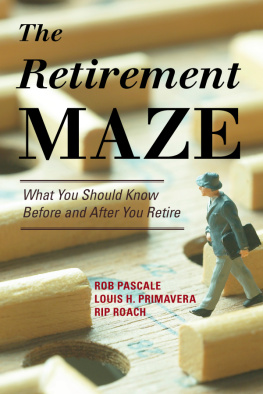







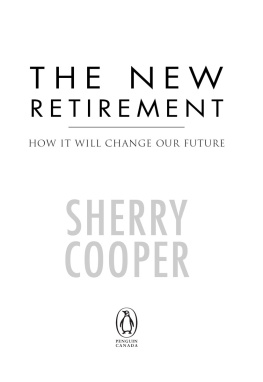
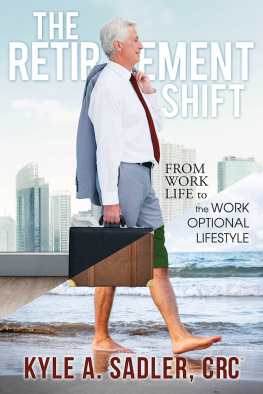

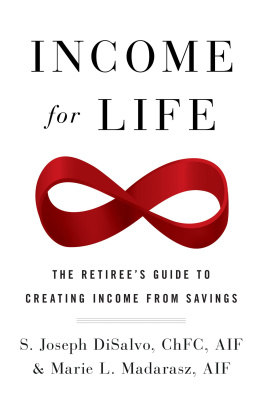
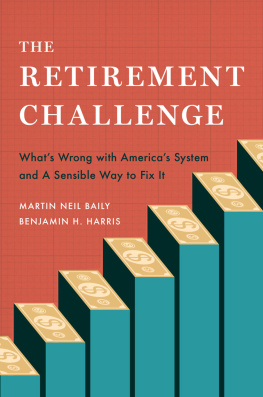
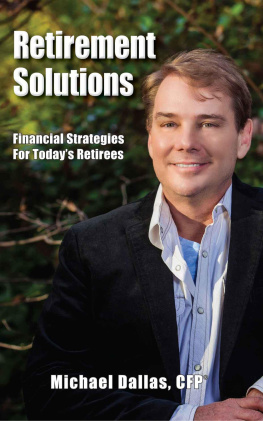
 The paper used in this publication meets the minimum requirements of American National Standard for Information SciencesPermanence of Paper for Printed Library Materials, ANSI/NISO Z39.48-1992.
The paper used in this publication meets the minimum requirements of American National Standard for Information SciencesPermanence of Paper for Printed Library Materials, ANSI/NISO Z39.48-1992.